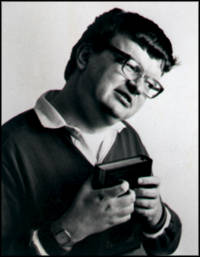
Savant syndrome is a phenomenon, sometimes following recovery from brain damage, that can create a condition in which someone despite often having significant mental disabilities demonstrates certain abilities far in excess of average. The skills that savants excel at are generally related to memory. This may include rapid calculation, artistic ability, map making, or musical ability. Usually, only one exceptional skill is present.
Bruno Bettelheim was an Austrian-born psychologist, scholar, public intellectual and writer who spent most of his academic and clinical career in the United States. An early writer on autism, Bettelheim's work focused on the education of emotionally disturbed children, as well as Freudian psychology more generally. In the U.S., he later gained a position as professor at the University of Chicago and director of the Sonia Shankman Orthogenic School for Disturbed Children, and after 1973 taught at Stanford University.
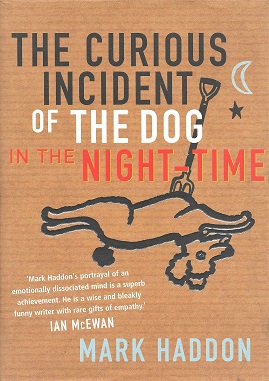
The Curious Incident of the Dog in the Night-Time is a 2003 mystery novel by British writer Mark Haddon. Its title refers to an observation by the fictional detective Sherlock Holmes in the 1892 short story "The Adventure of Silver Blaze". Haddon and The Curious Incident won the Whitbread Book Awards for Best Novel and Book of the Year, the Commonwealth Writers' Prize for Best First Book, and the Guardian Children's Fiction Prize. Unusually, it was published simultaneously in separate editions for adults and children.

The autism rights movement, also known as the autistic acceptance movement, is a social movement allied with disability rights that emphasizes a neurodiversity paradigm, viewing autism as a disability with variations in the human brain rather than as a disease to be cured. The movement advocates for several goals, including greater acceptance of autistic traits and behaviors; reforms of services - i.e. services that focus on improving quality of life and well-being instead of suppression and masking of autistic traits that are adaptive or not harmful or imitations of social behaviors of neurotypical (non-autistic) peers ; the creation of social networks and events that allow autistic people to socialize on their own terms; and the recognition of the autistic community as a minority group.
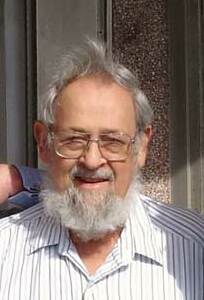
Bernard Rimland was an American research psychologist, writer, lecturer, and influential person in the field of developmental disorders. Rimland's first book, Infantile Autism, sparked by the birth of a son who had autism, was instrumental in changing attitudes toward the disorder. Rimland founded and directed two advocacy groups: the Autism Society of America (ASA) and the Autism Research Institute. He promoted several since disproven theories about the causes and treatment of autism, including vaccine denial, facilitated communication, chelation therapy, and false claims of a link between secretin and autism. He also supported the ethically controversial practice of using aversives on autistic children.
The refrigerator mother theory, also known as Bettelheim's theory of autism, is a largely abandoned psychological fringe theory that the cause of autism is a lack of maternal (figurative) warmth. Evidence against the refrigerator mother theory began in the late 1970s, with twin studies suggesting a genetic etiology, as well as various environmental factors. Modern research generally agrees that there is a largely epigenetic etiology of autism spectrum disorders.
Clive Exton was a British television and film screenwriter who wrote scripts for the series Poirot,Jeeves and Wooster, and Rosemary & Thyme.

Societal and cultural aspects of autism or sociology of autism come into play with recognition of autism, approaches to its support services and therapies, and how autism affects the definition of personhood. The autistic community is divided primarily into two camps; the autism rights movement and the Pathology paradigm. The pathology paradigm advocates for supporting research into therapies, treatments, and/or a cure to help minimize or remove autistic traits, seeing treatment as vital to help individuals with autism, while the neurodiversity movement believes autism should be seen as a different way of being and advocates against a cure and interventions that focus on normalization, seeing it as trying to exterminate autistic people and their individuality. Both are controversial in autism communities and advocacy which has led to significant infighting between these two camps. While the dominant paradigm is the pathology paradigm and is followed largely by autism research and scientific communities, the neurodiversity movement is highly popular among most autistic people, within autism advocacy, autism rights organizations, and related neurodiversity approaches have been rapidly growing and applied in the autism research field in the last few years.
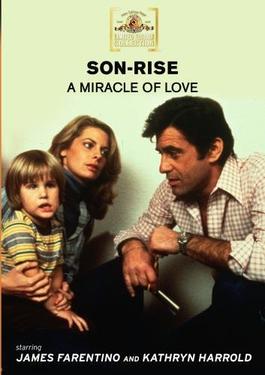
Son-Rise: A Miracle of Love is a televised docudrama film that aired on NBC in 1979 and is adapted from the nonfiction book Son-Rise by Barry Neil Kaufman. It is the real-life story of how, according to his parents, Raun Kaufman completely recovered from severe autism. The film was directed by Glenn Jordan and the teleplay was written by Stephen Kandel, Samahria Lyte Kaufman, and Barry Neil Kaufman.

Classic autism, also known as childhood autism, autistic disorder, (early) infantile autism, infantile psychosis, Kanner's autism,Kanner's syndrome, or just autism, is a neurodevelopmental condition first described by Leo Kanner in 1943. It is characterized by atypical and impaired development in social interaction and communication as well as restricted, repetitive behaviors, activities, and interests. These symptoms first appear in early childhood and persist throughout life.

Autism Speaks Inc. is a non-profit autism awareness organization and the largest autism research organization in the United States. It sponsors autism research and conducts awareness and outreach activities aimed at families, governments, and the public. It was founded in February 2005 by Bob Wright and his wife Suzanne, a year after their grandson Christian was diagnosed with autism. The same year as its founding, the organization merged with Autism Coalition for Research and Education. It then merged with the National Alliance for Autism Research in 2006 and Cure Autism Now in 2007.

Autism, formally called autism spectrum disorder (ASD) and autism spectrum condition (ASC), is a neurodevelopmental disorder characterized by deficits in social communication and social interaction, and repetitive or restricted patterns of behaviors, interests, or activities, which can include hyper- and hyporeactivity to sensory input. Autism is a spectrum disorder, meaning that it can manifest very differently in each person. For example, some are nonspeaking, while others have proficient spoken language. Because of this, there is wide variation in the support needs of people across the autism spectrum.
Autism spectrum disorders (ASDs) or autism spectrum conditions (ASCs) describe a range of conditions classified as neurodevelopmental disorders in the DSM-5, used by the American Psychiatric Association. As with many neurodivergent people and conditions, the popular image of autistic people and autism itself is often based on inaccurate media representations. Additionally, media about autism may promote pseudoscience such as vaccine denial or facilitated communication.

The Reason I Jump: One Boy's Voice from the Silence of Autism is a biography attributed to Naoki Higashida, a nonverbal autistic person from Japan. It was first published in Japan in 2007. The English translation, by Keiko Yoshida and her husband, English author David Mitchell, was published in 2013.
The history of autism spans over a century, autism has been subject to varying treatments, being pathologized or being viewed as a beneficial part of human neurodiversity. The understanding of autism has been shaped by cultural, scientific, and societal factors throughout history, and its perception and treatment change over time as scientific understanding of autism develops.

Thomas A. McKean is an American autistic author and lecturer. He is a poet, a singer-songwriter, an international speaker and a writer. He is the author of Soon Will Come the Light: A View From Inside the Autism Puzzle and Light On the Horizon: A Deeper View From Inside the Autism Puzzle. McKean has claimed that he did not speak until he was 16, but was able to describe how autism was like to him. He constantly fights various symptoms such as making strange noises, and says that perception of the senses causes low-intensity pain. McKean at one time earned a living traveling about and doing conferences and consulting work on autism. He has been described as having the unusual ability to be in the world of autism, yet also possesses the communication skills to describe what that world is like.

Life, Animated is a 2016 American documentary by director Roger Ross Williams. It is co-produced by Williams with Julie Goldman, Carolyn Hepburn and Christopher Clements. Life, Animated is based on journalist Ron Suskind's 2014 book Life, Animated: A Story of Sidekicks, Heroes, and Autism, which tells the story of his son, Owen Suskind, who struggled with autism and learned how to communicate with the outside world through his love of Disney films.
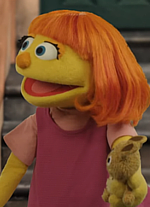
Julia is a fictional character on the PBS/HBO children's educational television series Sesame Street. She is an Anything Muppet, known for being the first Sesame Street character diagnosed with autism. Julia is a friendly four-year-old girl who enjoys bonding with her supportive family and her friends on Sesame Street. She first appeared in 2015 in an online autism awareness initiative from Sesame Workshop, entitled Sesame Street and Autism: See Amazing in All Children. Julia later made her first appearance on television series in the 4,715th episode, which originally aired on April 2, 2017.

All in a Row Live is a play by Alex Oates about a family with an 11-year-old child on the autism spectrum. The play explores the experiences of the parents of a nonverbal, sometimes violent, autistic boy and the emotions that they experience on the night before he is taken to a residential school for children with disabilities.

Current research indicates that autistic people have higher rates of LGBT identities and feelings than the general population. A variety of explanations for this have been proposed; The Lancet's "Commission on the future of care and clinical research in autism" commented that it "might be part of a different concept of self, less reliance on or reference to social norms, or part of a neurodiverse lived experience of the world."













